THE CONTEXT: The 2023 Nobel Prize in Physiology or Medicine was awarded jointly to Katalin Karikó and Drew Weissman “for their discoveries concerning base modifications that enabled the development of effective mRNA vaccines against COVID-19”. This article explains in detail the various aspects of the work of these Nobel laureates from the UPSC perspective.
THE NOBEL LAUREATES
The Nobel Laureates
- Katalin Kariko (Hungary):University of Pennsylvania, USA
- Drew Weissman (USA): University of Pennsylvania, USA
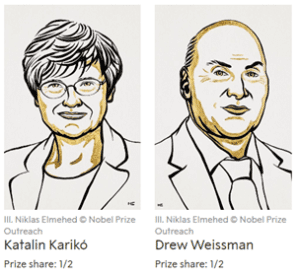
NOBEL LAUREATES IN THE FIELD OF PHYSIOLOGY/MEDICINE
Research on Unmodified mRNA and Base – modified mRNA
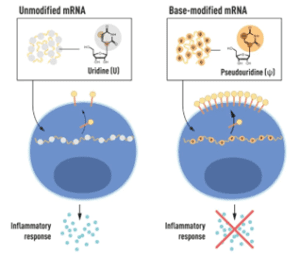
Vaccines before the pandemic:
- Vaccination stimulates the formation of an immune response to a particular pathogen.
- This gives the body a head starts in the fight against disease in the event of a later exposure.
- Vaccines based on killed or weakened viruses have long been available, exemplified by the vaccines against polio, measles, and yellow fever.
- In 1951, Max Theiler was awarded the Nobel Prize in Physiology or Medicine for developing the yellow fever vaccine.
Producing protein-, vector-, or whole virus- was time consuming as they require large-scale cell culture.
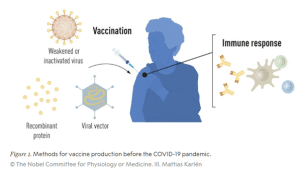
Vaccines after the COVID-19 pandemic: mRNA vaccines
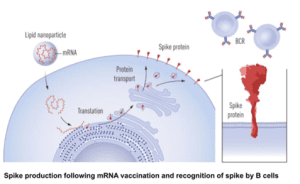
- The basis for these vaccines is messenger RNA, or mRNA. The messenger RNA molecules that instruct the body’s cells to produce certain proteins are used in mRNA vaccines.
- The mRNA vaccines are being developed to protect against other respiratory infections, such as influenza, respiratory syncytial virus (RSV), and metapneumovirus.
- The mRNA vaccines have been shown to be highly effective against COVID-19, preventing serious illness, hospitalization, and death.
ABOUT THE mRNA VACCINES
- The mRNA is a molecule that carries instructions from DNA to the ribosome, where proteins are made. mRNA vaccines work by delivering mRNA molecules into cells.
- The mRNA molecules are then translated into proteins, which are displayed on the surface of the cell. The immune system then recognizes the proteins as foreign and produces antibodies and other immune cells against them.
- If the body is later infected with the pathogen that the vaccine is targeting, the immune system will be able to quickly recognize and destroy the pathogen.
HOW ARE THESE VACCINES DIFFERENT (mRNA VS. DNA)?
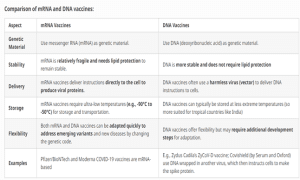
WHAT DID KATALIN KARIKÓ AND DREW WEISSMAN DISCOVER?
In 2023, Kariko and Weissman were awarded the Nobel Prize in Physiology or Medicine for their groundbreaking work on mRNA. Their discovery is one of the most important scientific advances in the world, and it has the potential to revolutionize the way we prevent and treat diseases in the ecosystem. Katalin Karikó and Drew Weissman’s discovery of how to modify mRNA to make it more stable and less inflammatory was a critical breakthrough in the development of mRNA vaccines. Their work has had a profound impact on the world, and it has the potential to revolutionize the way we prevent and treat diseases.
Their Discovery:
- Unmodified mRNA is unstable and inflammatory. When unmodified mRNA is injected into the body, it is quickly degraded by enzymes and can trigger an inflammatory response.
- Karikó and Weissman discovered that modifying a single nucleotide in mRNA could make it much more stable and less inflammatory. This modification, known as pseudouridylation, reduces the recognition of mRNA by the body’s immune system and prevents the inflammatory response.
- Their discovery made it possible to develop safe and effective the mRNA vaccines. The mRNA vaccines can be used to deliver instructions to cells to produce proteins that can protect against infection or disease.
Karikó and Weissman’s work has had a number of important applications, including:
- The development of mRNA vaccines against COVID-19. The mRNA vaccines have played a critical role in the fight against COVID-19, and they are now widely used to protect people from the virus.
- The development of the mRNA vaccines against other diseases. The mRNA vaccines are currently being developed to protect against a wide range of other diseases, including malaria, cancer, and HIV.
- The development of mRNA therapies. mRNA can also be used to deliver instructions to cells to produce proteins that can treat diseases. For example, mRNA therapies are being developed to treat cancer and genetic disorders.
THE BREAKTHROUGH
The breakthrough of the mRNA is a major scientific achievement that has the potential to revolutionize medicine. The mRNA vaccines are a new type of vaccine that uses messenger RNA (mRNA) to teach the body how to make proteins that can trigger an immune response. This makes it possible to develop vaccines against a wide range of diseases, including those that are difficult to vaccinate against using traditional methods. The mRNA vaccines are also very fast to develop, which makes them ideal for responding to new and emerging threats. For example, the mRNA vaccines against COVID-19 were developed in past record 2020.
The breakthroughs that have made the mRNA vaccines possible:
- The discovery of how to modify mRNA to make it more stable and less inflammatory. This was essential for developing safe and effective mRNA vaccines.
- The development of lipid nanoparticles (LNPs) to deliver mRNA to cells.
- LNPs are tiny fat particles that can protect the mRNA from degradation and help it to enter cells.
- The development of efficient methods for manufacturing mRNA in large quantities. This has made it possible to produce mRNA vaccines on a scale that is needed to vaccinate millions of people.
The breakthrough of mRNA is a testament to the power of scientific research and innovation. It has opened up new possibilities for preventing and treating diseases, and it has the potential to save millions of lives.
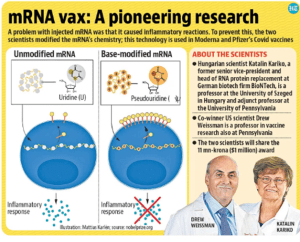
APPLICATION OF BASE-MODIFIED mRNA VACCINES
Base-modified mRNA vaccines are a new type of mRNA vaccine that uses modified mRNA nucleosides to improve the stability, safety, and efficacy of the vaccine. Modified mRNA nucleosides are synthetic nucleotides that have been chemically modified to alter their properties.
Base-modified mRNA vaccines have a number of potential advantages over traditional mRNA vaccines:
- Increased stability:Modified mRNA nucleosides are more resistant to degradation than unmodified mRNA nucleosides. This means that base-modified mRNA vaccines can be stored for longer periods of time and can be delivered to the body using a wider range of delivery methods.
- Reduced immunogenicity:Modified mRNA nucleosides are less likely to trigger an immune response than unmodified mRNA nucleosides. This reduces the risk of side effects and allows for repeat dosing.
- Increased efficacy:Modified mRNA nucleosides can improve the translation of mRNA into proteins. This means that base-modified mRNA vaccines can produce a stronger immune response.
Base-modified mRNA vaccines are still in the early stages of development, but they have the potential to be used to develop vaccines against a wide range of diseases, including:
- Infectious diseases: Base-modified mRNA vaccines are being developed to protect against infectious diseases such as COVID-19, influenza, malaria, and HIV.
- Cancer:Base-modified mRNA vaccines are being developed to treat cancer by targeting tumor-specific antigens.
- Rare diseases:Base-modified mRNA vaccines are being developed to treat rare diseases caused by genetic mutations.
Some specific examples of mRNA vaccines that are currently in development for use after the COVID-19 pandemic:
- Moderna:Moderna is developing mRNA vaccines for influenza, RSV, HIV, and cancer.
- Pfizer-BioNTech:Pfizer-BioNTech is developing mRNA vaccines for influenza, RSV, malaria, and shingles.
- CureVac:CureVac is developing mRNA vaccines for influenza, rabies, and Zika virus.
- Arcturus Therapeutics:Arcturus Therapeutics is developing mRNA vaccines for COVID-19 variants, influenza, and RSV.
Base-modified mRNA vaccines are a promising new technology with the potential to revolutionize the way we prevent and treat diseases. As base-modified mRNA vaccine technology continues to advance, we can expect to see even more innovative and effective vaccines against a wide range of diseases.
WHAT ARE mRNA VACCINES AND HOW DO THEY WORK?
The mRNA vaccines are a new type of vaccines that use messenger RNA (mRNA) to teach the body how to make proteins that can help in immunity system. mRNA is a molecule that carries instructions from DNA to the ribosome, where proteins are made.
How mRNA vaccines work?
- An mRNA vaccine is injected into the body.
- The mRNA enters cells and is translated into proteins.
- The proteins are displayed on the surface of the cell.
- The immune system recognizes the proteins as foreign and produces antibodies and other immune cells against them.
- If the body is infected with the pathogen that the vaccine is targeting, the immune system will be able to quickly recognize and destroy the pathogen.
The mRNA vaccines have a number of advantages over traditional vaccines:
- They are very fast to develop, because they do not require the cultivation of live viruses or bacteria.
- They can be easily modified to target different pathogens, making them a versatile platform for developing vaccines against new and emerging threats.
- They are generally very safe, with mild side effects being the most common.
- They have been shown to be highly effective against COVID-19, preventing serious illness, hospitalization, and death.
SIGNIFICANCE THE DISCOVERY OF mRNA VACCINES
The significance of the Nobel Prize awarded to Katalin Karikó and Drew Weissman for their contributions to mRNA vaccines is multi-faceted and has wide-ranging implications. The significance of their work:
RECOGNITION OF PIONEERING MRNA RESEARCH
- The groundbreaking discoveries in using modified nucleosides in synthetic mRNA can lay the foundation for mRNA vaccine technology.
REVOLUTION IN VACCINE DEVELOPMENT
- The Nobel Prize underscores the revolutionary impact of mRNA vaccines on the field of vaccinology. These vaccines represent a paradigm shift, offering a faster and more adaptable approach to vaccine development.
GLOBAL HEALTH IMPACT
- The award acknowledges the role of mRNA vaccines in addressing the global COVID-19 pandemic. mRNA vaccines like Pfizer-BioNTech and Moderna have been instrumental in controlling the spread of the virus.
COLLABORATION AND INTERDISCIPLINARY SCIENCE
- It highlights the collaborative efforts of scientists from different backgrounds and countries. Their collaboration underscores the importance of international cooperation and interdisciplinary research in addressing global health challenges.
INSPIRATION FOR FUTURE RESEARCH
- It reinforces the importance of perseverance and long-term commitment to scientific endeavors.
ECONOMIC AND SOCIETAL IMPACT
- The significance of mRNA vaccines extends beyond science and has social and economic ramifications in terms of vaccine manufacturing, distribution, and access.
EDUCATIONAL IMPLICATIONS
- It underscores the importance of investing in scientific research and education to drive medical advancements and address global health challenges effectively
THE CONCLUSION: The Nobel Prize awarded to Katalin Karikó and Drew Weissman for their contributions to mRNA vaccines is significant role in future. This is because it not only recognizes their individual and collaborative achievements but also highlights the transformative impact of mRNA vaccine technology on public health, global disease control, and the future of medical research and development. Thanks to the progress in molecular biology in recent decades, vaccines based on individual viral components, rather than whole viruses, have been developed.
UPSC PERSPECTIVE QUESTIONS
Q.1 Recent breakthroughs in mRNA technology have revolutionized the fields ranging from vaccines to therapeutics. Discuss the significance of these advancements.
Q.2 What is mRNA technology? Discuss the challenges and ethical considerations associated with the use of mRNA. How can India harness this technology for public health and scientific advancement?
UPSC Civil Services Examination (PYQs)
Prelims
Q. In the context of vaccines manufactured to prevent COVID-19 pandemic, consider the following statements: (2022)
1. The Serum Institute of India produced COVID-19 vaccine named Covishield using mRNA platform.
2. Sputnik V vaccine is manufactured using vector-based platform.
3. COVAXIN is an inactivated pathogen-based vaccine.
Which of the statements given above are correct?
(a) 1 and 2 only
(b) 2 and 3 only
(c) 1 and 3 only
(d) 1, 2 and 3
Answer: B
Mains
Q.1 What is the basic principle behind vaccine development? How do vaccines work? What approaches were adopted by the Indian vaccine manufacturers to produce COVID-19 vaccines? (2022)
Spread the Word
